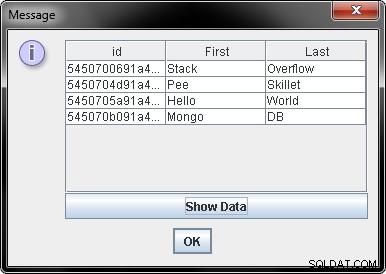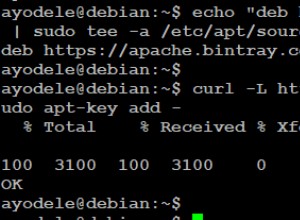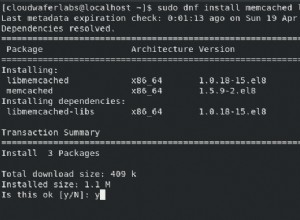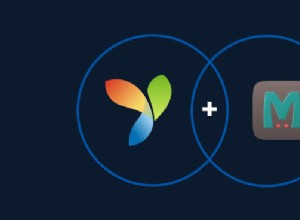DBCursor
soll iteriert werden. Sie können den DBCursor#hasNext()
wie ein normaler Iterator , und der DBCursor#next()
um das nächste DBObject zu erhalten
. Das DBObject ermöglicht Ihnen get
Werte wie eine Map , indem Sie den Schlüssel
Nehmen wir also an, wir haben eine Sammlung table im swingtest Datenbank, mit den folgenden Dokumenten
{ "_id" : ObjectId("5450700691a43786388fcc8f"), "first" : "Stack", "last" : "Overflow" }
{ "_id" : ObjectId("5450704d91a43786388fcc90"), "first" : "Pee", "last" : "Skillet" }
{ "_id" : ObjectId("5450705a91a43786388fcc91"), "first" : "Hello", "last" : "World" }
{ "_id" : ObjectId("545070b091a43786388fcc92"), "first" : "Mongo", "last" : "DB" }
Sie haben noch nicht genau angegeben, was Sie mit der Sammlung machen wollen, also nehmen wir an, Sie möchten die Daten zu einer JTable hinzufügen , könnten Sie so etwas tun wie
MongoClient mongoClient = null;
DBCursor cursor = null;
try {
mongoClient = new MongoClient( "localhost" , 27017 );
DB db = mongoClient.getDB( "swingtest" );
DBCollection coll = db.getCollection("table");
cursor = coll.find();
String[] columnNames = {"id", "First", "Last"};
DefaultTableModel model = new DefaultTableModel(columnNames, 0);
while(cursor.hasNext()) {
DBObject obj = cursor.next();
String first = (String)obj.get("first");
String last = (String)obj.get("last");
ObjectId id = (ObjectId)obj.get("_id");
model.addRow(new Object[] { id, first, last });
}
table.setModel(model);
cursor.close();
mongoClient.close();
}
wobei wir für jede Iteration (Dokument) die _id erhalten , first und last Werte, erstellen Sie dann eine Zeile, in der wir das DefaultTableModel hinzufügen . Am Ende der Iteration legen wir das Modell für die JTable fest .
Hier ist das vollständige Beispiel

import com.mongodb.DB;
import com.mongodb.DBCollection;
import com.mongodb.DBCursor;
import com.mongodb.DBObject;
import com.mongodb.MongoClient;
import java.awt.BorderLayout;
import java.awt.Dimension;
import java.awt.event.ActionEvent;
import java.awt.event.ActionListener;
import java.net.UnknownHostException;
import java.util.logging.Level;
import java.util.logging.Logger;
import javax.swing.JButton;
import javax.swing.JOptionPane;
import javax.swing.JPanel;
import javax.swing.JScrollPane;
import javax.swing.JTable;
import javax.swing.SwingUtilities;
import javax.swing.table.DefaultTableModel;
import org.bson.types.ObjectId;
public class MongoStackoverflow {
private static JTable table;
public static void main(String[] args) {
Runnable runnable = new Runnable() {
public void run() {
table = new JTable(){
@Override
public Dimension getPreferredScrollableViewportSize() {
return new Dimension(300, 150);
}
};
JPanel panel = new JPanel(new BorderLayout());
JButton button = new JButton("Show Data");
button.addActionListener(listener);
panel.add(new JScrollPane(table));
panel.add(button, BorderLayout.PAGE_END);
JOptionPane.showMessageDialog(null, panel);
}
};
SwingUtilities.invokeLater(runnable);
}
static ActionListener listener = new ActionListener() {
@Override
public void actionPerformed(ActionEvent e) {
MongoClient mongoClient = null;
DBCursor cursor = null;
try {
mongoClient = new MongoClient( "localhost" , 27017 );
DB db = mongoClient.getDB( "swingtest" );
DBCollection coll = db.getCollection("table");
cursor = coll.find();
String[] columnNames = {"id", "First", "Last"};
DefaultTableModel model = new DefaultTableModel(columnNames, 0);
while(cursor.hasNext()) {
DBObject obj = cursor.next();
String first = (String)obj.get("first");
String last = (String)obj.get("last");
ObjectId id = (ObjectId)obj.get("_id");
model.addRow(new Object[] { id, first, last });
}
table.setModel(model);
cursor.close();
mongoClient.close();
} catch (UnknownHostException ex) {
Logger.getLogger(MongoStackoverflow.class.getName()).log(Level.SEVERE, null, ex);
} finally {
if (cursor!= null) {
cursor.close();
}
if (mongoClient != null) {
mongoClient.close();
}
}
}
};
}
Ressource




